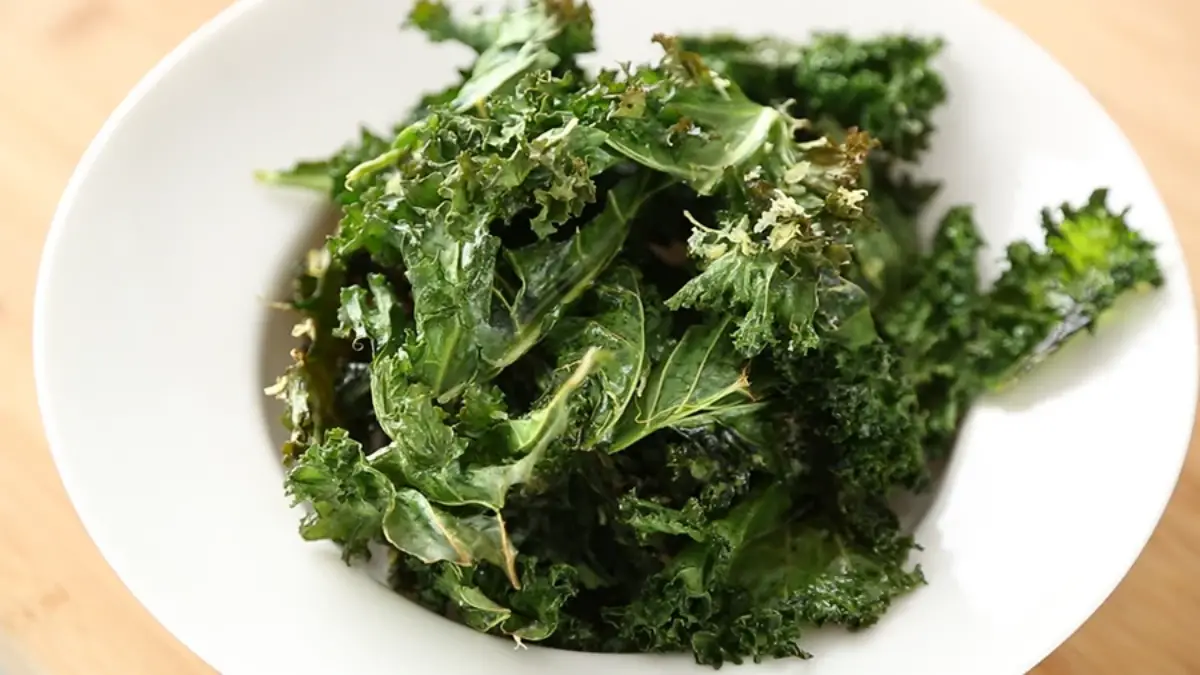If youre looking for a flavorful, healthy snack that wont leave you feeling guilty after eating it, look no further than baked kale chips! Kale is an incredibly versatile ingredient that can be used in many different savory and sweet dishes.
Plus it isnt filled to the brim with fat and sodium like its potato cousin, making kale chips a far healthier alternative.
We could sing the praises of kale chips all day, just as many others have done before. But we think its important you know its not all sunshine with kale chips.
So in this short article, well cover the good and bad of kale chips, what each crunchy bite means for your health, and show you just how easy it is to make kale chips at home in a matter of minutes.
Healthy alternative: Baked kale chips are much lighter compared to traditional potato chips or other fried snacks. They’re low in calories, but kale is packed with vitamins and minerals, making homemade kale chips an ideal snack for any time of the day. They’re even great as a side dish for burgers and sandwiches!

Vitamins, Minerals, and Nutrients: Oh My!
The amount of nutrients in a bunch of kale has immense benefits including antioxidants, which are valuable for your overall well-being and can prevent and fight off cardiovascular diseases, inflammation, and even cancer.
In addition to Vitamin A (praised above), kale contains two other main vitamins including 684 percent of your daily intake of vitamin K per cup. This promotes proper blood clotting. Kale also contains vitamin C, which acts as a powerful antioxidant.
Oh, and dont forget that kale is rich in fiber, which aids in digestion. It contains iron, protein, potassium, and more calcium than a glass of milk. Were rambling now, but dark leafy green is a powerhouse for health, huh?
Although the list of good could be endless, facing reality by highlighting the negatives is the next step.
My family loves kale chips. We love leafy greens in general, but it is amazing what a transformation kale undergoes when heated at low temperature in the oven.
For something a little bit different, try furikake kale chips. If you’re unfamiliar with this Japanese seasoning, it’s made of tiny pieces of seaweed combined with sesame seeds, salt and sugar, and sometimes other ingredients such as flaked bonito. You can find it in the Asian aisle of most supermarkets or at any Asian grocery store. It’s intended for rice, but it’s great on everything. A sprinkling of furikake will transport you and your kale chips from your kitchen to Japan.
My basic kale chip recipe simply involves kale roasted with sea salt and olive oil. But that is just the wonderful beginning to an entire universe of kale chip possibilities.
My kids can devour an entire head of kale prepared this way in five minutes flat. And unlike potato chips, kale retains its nutritional value when made into chips. Kale is high in fiber, antioxidants, vitamin A and calcium, as well as B vitamins, vitamin C and potassium. It’s fat- and sodium-free, and the minuscule amounts of olive oil and salt used in my recipe barely bump up those amounts.
How to Make Crispy & Delicious Kale Chips
FAQ
Is roasted kale still good for you?
Does cooking kale destroy nutrients?
What is the healthiest way to eat kale?
Is baked kale easier to digest?
Is boiled Kale healthier than baked Kale?
In comparison, 1 cup of boiled kale contains the following nutrition facts per the USDA: The vitamins in boiled kale include calcium, iron and potassium. Like baked kale, boiled kale contains high amounts of vitamin A and C. Consuming raw kale is more nutritious than baked kale.
Is kale good for health?
Kale is a highly nutritious dark green leafy vegetable that is rich in vitamins A, C, and K as well as sulfur compounds(glucosinolates) that have been linked to cancer prevention. It is a fiber rich, high quality plant based source of calcium and omega-3 fatty acids. Tuscan kale (also known as lacinato or dinosaur kale) is easier to incorporate into the diet, tastes better than other types of kale, and can be eaten raw or cooked. Add at least one cup of cooked or two cups of raw kale or other green leafy vegetables regularly throughout the week.
Should you cook Kale?
Cooking kale might make the vegetable more palatable and easier to digest. The downside is that cooking can reduce the antioxidant and mineral content in kale, but some cooking methods are worse than others. “If you were to boil kale, you’re going to have heat, and heat will denature the antioxidants, so vitamin C will get destroyed.
Is Kale good for your gut?
One cup of kale has 94% of the recommended daily amount of vitamin K, which is important for blood clotting and bone formation. However, some of these nutrients are wrapped inside fibrous cell walls, which means your gut has to work harder to absorb them, according to Heather Anita Garcia, MS, RD, a registered dietitian based in Los Angeles.
